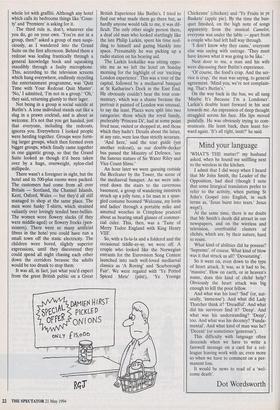Mind your language
'WHAT'S THE matter?' my husband asked, when he found me sniffling next to the wireless in the kitchen.
I admit that I did weep when I heard that Mr John Smith, the Leader of the Opposition, had died (though I note that some liturgical translators prefer to refer to the activity, when putting St John's Gospel into English, in such terms as, 'Jesus burst into tears.' Jesus wept!).
At the same time, there is no doubt that Mr Smith's death did attract in our newspapers, and on the wireless and television, overfruitful clusters of clichés, which are, by their nature, hard to resist.
What kind of abilities did he possess? 'Supreme', of course. What kind of blow was it that struck us all? 'Devastating'.
So it went on, even down to the type of heart attack. It was, as it had to be, 'massive'. How on earth, or in heaven's name, does this kind of cliché help? Obviously the heart attack was big enough to kill the poor fellow.
And what was his loss? 'Sad' (or, nat- urally, 'immense). And what did Lady Thatcher think it? 'Dreadful'. And what did his survivors find it? 'Deep'. And what was his understanding? 'Deep', too. And what was his decency? 'Funda- mental'. And what kind of man was he? 'Decent' (or sometimes `generous').
This difficulty with language often descends when we have to write a farewell message on a card for a col- league leaving work with us; even more so when we have to comment on a per- manent loss.
It would be news to read of a 'wel- come death'.
Dot Wordsworth




































































 Previous page
Previous page